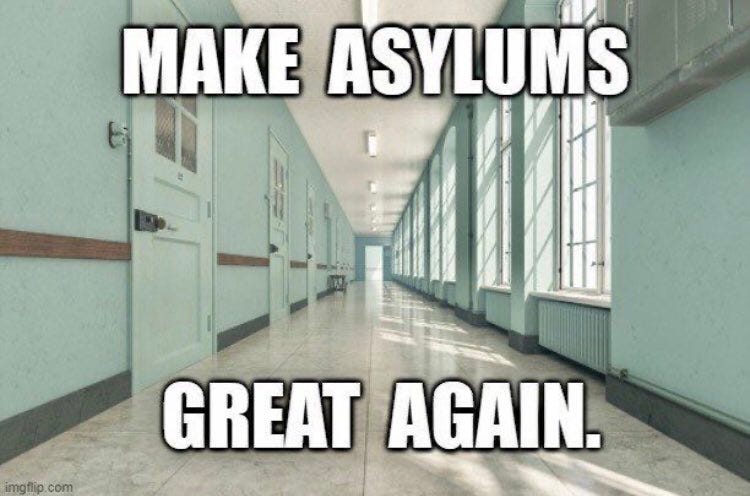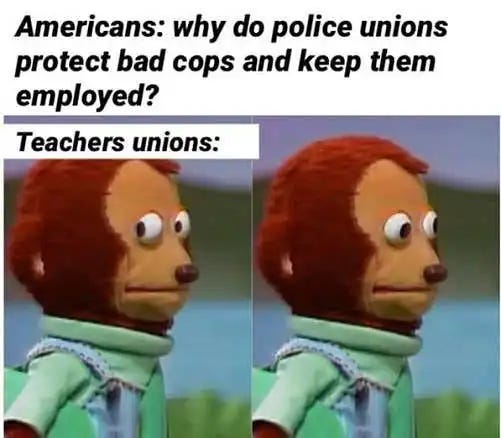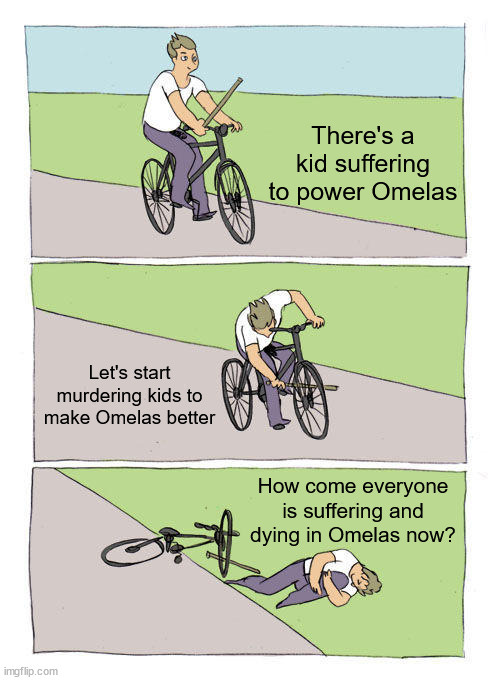Utopia Minus One: The Omelas Trolley Problem
When I discovered Omelas, and other trolley problems (part one of a series)
Locked in a cage with all the rats
I've slipped through the cracks
And now I'm stuck with the scraps and I can't seem to find my way back
Get me out, get me out of here
-Annie
I encountered Omelas first in middle school, I think. (I believe I actually superficially read the story before then from an anthology of dystopian children’s stories in a killing-time-in-the-back-of-the-school-bus sort of fashion, probably in second or third grade, but it made no impression: I instead remember Ray Bradbury’s All Summer In A Day.) But in middle school it was core curricula and the teacher decided it was a fine thing for us all to discuss and broaden our minds. As teachers do.
Ursula K Le Guin wrote a rather vivid and memorable short story about utilitarianism called The Ones Who Walk Away from Omelas, which teachers delight in using to introduce students to moral quandaries and students delight in using to turn the classrooms on their heads. It’s a Hugo short story winner, it’s generally worth reading inasmuch as it’s brief and a classic of the space and much more poetic than the usual trolley problem. If you’ve not read it, it’s easily enough found online; I searched up a PDF here but I can’t guarantee the link will last. It’s inspired various “answer stories” as well, and The Ones Who Stay And Fight looks at the, err, rival city of Um-Helat, originally from How Long Until Black History Month. I’ll cite various other “answer stories” below, but rather than divert you endlessly at this point: if you’re not familiar with Omelas, let me summarize.
The story opens on the summer solstice in Omelas, a city of unbelievable happiness and delight, a city of bright towers and red roofs, great parks and harbors full of boats, with its streets and meadows alive with a festival and a horse race. The vibrant festival atmosphere, however, seems to be an everyday characteristic of the blissful community, whose citizens, though possibly limited in their technology and resources, are still intelligent, sophisticated, and cultured. Omelas has no kings, soldiers, priests, or slaves - nor other roles Le Guin finds offensive, such as no stock exchange, no secret police, and no advertisement. The specific socio-politico-economic setup of the community is not mentioned; the narrator merely claims not to be sure of every particular - perhaps there are trains and power, perhaps not; if there are cars and helicopters, they do not clutter the streets, it is something of a fairy tale and it is intended to remain that way. There is no guilt - an assertion I find extremely dubious - and the narrator is deliberately indecisive as to whether the society has dazzlingly high technology or is nearly primitive, but the overall feeling is that in either case they prefer to live close to nature and in harmony with their environment. In short, they are a utopia, or very nearly so; what I will describe as a utopia-minus-one, for Omelas is somehow brought to and supported in this state of euphoria by the neglect and suffering of one child imprisoned in the basement of a building there. How? Some sort of sadistic magic, apparently, because any attempt to ease the child’s suffering or improve their condition would cause Omelas to decay immediately. And this is all presented by a narrator who tells you that everyone in Omelas becomes aware of this child’s plight as part of their coming-of-age tradition and then has only two choices: to accept things as they are, or to turn your back and Walk Away From Omelas, with some mysterious pronouncements given that no one knows where they might go but that they all seem to understand where they are going.
Now a careful read of the story will indicate that Omelas may have been written as a legitimate utopia and the flaw, the cost, the suffering of one child that everyone else might still enjoy a wonderful city - well, that may exist because the reader will not find a utopian society plausible otherwise. And the Ones Who Walk Away to a place that the reader can’t even comprehend - well, the narrator has literally just finished smugly telling us that we couldn’t comprehend the possibility a city without evil, a utopian Omelas without the necessity for the suffering child. We may just have a narrator who is very full of herself, who might be just a wee bit of an author mouthpiece for hippie-anarchist author Ursula K LeGuin, implying that those who walk away from Omelas do so in order to go found the Actual Perfect City… and not just starve in the woods, or be eaten by a bear, or live in a shack like the Unabomber. Disregard for a moment that exile from civilization generally has been nigh-synonymous with death and pretend that it’s ascension, instead.
As with many of these sort of definitional quandaries, I want to I think: “There are more things in heaven and earth, Horatio, than are dreamt of in your philosophy.” Now don’t take it as criticism when I say that Ursula Le Guin was an anarchist; she claimed that title herself and she wasn’t the dimwit Smash-The-State sort but rather focused on how society might work with different social structures; I found it at least philosophically appealing if perhaps unlikely to actually work out like its proponents hoped. I rather enjoyed the Wizard of Earthsea novels, I thought The Dispossessed was interesting and influential if problematic, and I should have liked to have met her but I'm afraid we never crossed paths. But I think as far as anarchists go, I’d rather raise a drink with Leslie Fish.

Anyway, as I said, I encountered Omelas in middle school, and I took this quandary at more or less face value. All right, there’s a city-state that is somehow … magically supported in a state of utopia by what amounts to human sacrifice. Fine, whatever, the plausibility meter is at zero and I’d secretly hoped the plot twist was that the Conquistadors were going to show up and kill off the child sacrificing Aztec priest expys, but let’s go with it as a morality play.
Our teacher had the class go through this essay, we talked through the basic moral quandary of the whole thing, explained how everyone once they come of age in Omelas is then making an informed choice knowing how Omelas works, how it is “powered”, as to whether they want to continue to be part of it. And there’s a fairly anvilicious presentation from Le Guin as to the moral superiority of being one of the Ones Who Walk Away From Omelas, who reject continued involvement in this system. (As I recall, in the same class/same time, we also covered Shirley Jackson’s classic short story The Lottery, also dystopian and worth a read, similar theme but not quite the same sort of situation; at the time we didn’t have The Hunger Games… and our teachers weren’t likely to point us to the video store to rent Logan’s Run.)
As with any philosophical discussion in middle school, there was no great consensus, but quite a number of us felt that this was varying degrees of dumb, though we lacked the grounding in philosophical terminology to properly argue it. A reasonable point was made if Omelas was only making one person suffer and it improved things for everyone else, this was generally better than any other society in existence that forced a whole lot of people to suffer and generally improved things for only relatively few. Another fairly popular line of thought was Omelas should Just Stop Doing That and live their lives like everyone else, be a “normal city” (and thus subject to all the normal dysfunctions and ills but not this one particularly odd new one) rather than some strange utopia-but-powered-by-dark-magic. Some folks were all for Smash The State, Down With Omelas (let’s be fair, some folks always are for Smash The State, these same chuds would have advocated it in math class if they’d had an excuse to do so). Others thought it was particularly unpleasant that Omelas chose innocent kids for this and said “well, why not criminals on death row? or people in hospice who didn’t have long to live anyway? or even take volunteers?” The teacher, perhaps naively, or perhaps trying to bend the conversation back towards a this-is-a-Jesus-parable metaphor without using those terms because it was a public school and he was a Jewish teacher, said that maybe it required a certain amount of innocence. This led immediately into the wrong minefield, though, because one of the other kids who didn’t often say much decided now was the time to pop up with “oh so in Omelas the abortionists would be harvesting babies to power Satan’s murder machine” - then the room was very quiet, then suddenly very loud, and then after that day the whole classroom Walked Away From Omelas and we didn’t cover that in class anymore.
So when in university the professor dragged this essay back out, I sort of mentally groaned, and thought about how to handle it. It seemed like it’d be plausible to immediately challenge the premise of the story and say “No, the protagonist is just as immoral as everyone else, they’re still accepting the child’s mistreatment, the only acceptable solution is to change the system, you have to Take A Third Solution” and see if we could get people talking about that instead, whether it was going to be a Let’s Smash The State conversation or Omelas’s Dark Room As Means Of Corporal Punishment police state conversation or the Metaphor for Conscription “Everyone Gets A Day In The Room When You Come Of Age And That’s The Price For Utopia” and we could go down the Service Guarantees Citizenship aspect of Starship Troopers et al, all of which are endlessly more interesting than this tedious fairy tale.
But instead I went with a different thesis, and unfortunately the teacher had a quick riposte to this theory. My premise was that Omelas was a slighly distorted jumble for Asylum - that the point Le Guin was making was a subversive reactionary statement that society benefited from institutionalization of the mentally ill, that she was implying that the world was a better place if there was still an incarceration policy for the people who were homeless, junkies, schizophrenic, multiple personality disorder, all the usual suspects for people who would previously have been held in mental institutions if not outright lobotomized. Unfortunately, there was actually a Word of God answer: Le Guin had named Omelas for a highway sign read backwards, “Salem, Oregon” was truncated to “Salemo” and reversed to Omelas”. My attempt to go Arkham Asylum with this was foiled.
There was some unexciting should-we-try-to-get-more-people-to-leave-Omelas. General consensus that yes, that would make things worse. Our professor discouraged any attempts to find a better solution, by which I mean “one minimizing human suffering,” and kept trying to focus us on the conundrum aspects of the trolley problem situation. (Are you familiar with the trolley problem? If not, I have summarized in a previous substack article, linked here.)
I read the room enough to know that I was going to get absolutely no where trying to advocate imperialism and a policy that Omelas should demand tribute of children from its subject states in order to preserve its way of life, even if I thought the professor would have secretly welcomed that as a critique on the American hegemony, the Cold War, and proxy wars in third world countries. It was that sort of liberal arts institution, after all. But I felt like even if offered up as ironically as possible it might still be taken as the sort thing that would cause someone too much consternation - this was the Political Correctness era, after all, and in another classroom the same semester I was writing an unironic essay on I, Rigoberta Menchu, the famously fraudulent biography of the eponymous Guatamalan Nobel Peace Price winner and peace activist, where the only acceptable essays were hagiographies of this veritable saint of the oppressed indigenous feminist movement. So I shrugged and went down the Che Guevara path of We Should Rise Up And Smash The State, it was a familiar enough story line and the students rallied well enough to the message that if any one of us are oppressed we all are. This was a little ridiculous, we were all a bunch of relatively well off kids from polite suburban backgrounds or upper-class-if-not-aristocratic international backgrounds in order to be able to attend this delightful little liberal arts university. But what the hell, it was usually the petty bourgeoisie who fueled the revolution, right? Yeah, don’t make me laugh, nobody in that classroom was going to storm the barricades, they were all going to grow up to be a bunch of Karens.
Of course, a bit of different mindset might lead... elsewhere. But we will get to that in the next essay, or possibly the following.
In the meantime, what if the solution to the Omelas quandary was to Take A Third Option?
You're telling me the supernatural favor of this city is somehow, implausibly as this may sound, powered by some sort of sacrifice they make by tormenting a child? Not really even tormenting them, just by locking them in a room and neglecting them? And we're sure it has to be a child, not someone we'd otherwise lock in solitary confinement?
All right then. And one child powers this much growth, euphoria, wisdom, vitality, health, success, good weather, prosperity, for a city of thousands, for years and years?
Does it have to be one of our children, or could we hypothetically acquire a slave, or an unwanted orphan, or as above - someone who was going to be aborted, whether that child was a citizen of Omelas or of somewhere else?
All this - all what you see - is the impact of one child's sacrifice. Would you see some sort of corresponding leap further forward if you instead were to lock away... two children? And if that works, then how long before the powers that be decide to make things still better by tripling down instead...
In any other city in the world, any other city the size of Omelas, ten thousand people are supported not in delight and prosperity and utopia by the suffering of one person but instead ten thousand people survive at varying degrees of mediocrity and suffering, with only a few amongst them coming close to the level of comfort and wisdom and ease that the citizens of Omelas take for granted. It is no exaggeration to say that Omelas is better for literally everyone except one person, it is definitionally a utopia minus one… which incidentally, can't be true… there's a very pragmatic takedown of the premise that I read at one point, and sadly I have lost the source as to who said it apart to attributing it to to "Zelenka":
The people can't all be happy. There are the parents who had to give up their 3 yo for torture, and all the parents of children under 5, knowing their child could be chosen when this one dies.
One implies a level of underlying malaise on Omelas of the "you might be next" variety, but people are often good at thinking that nothing bad will ever happen to them.
Fast forward again, this time several decades, to the COVID lockdowns and teachers are driving themselves and their students crazy trying to give them anything to think about. My daughter brings me an essay that she wants to discuss. Wouldn’t you know it, we’re talking about Omelas, along with Um-Helat, the city where everyone is brainwashed, which seems like a great parable for modern education.
The situation in Omelas is perhaps intended as a refutation of utilitarianism; Omelas somehow survives and provides a high standard of living for everyone else in the city at the expense of one person who suffers greatly. "Would you accept that many live a happy productive comfortable life at the expense of one person who suffers? How about two? What if instead Omelas were supported by a whole second city of slaves? Or even a nation?" One person's suffering is the smallest quantum of injustice here (arguably this is untrue, if you wished to make this example even more dramatic, what if the child had only to endure torture for a year? A month? A day?) and yet the reader is still invited to walk away from Omelas as an unacceptable situation or to even consider freeing and healing the child at the expense of bringing down the whole system. If utilitarianism can be perhaps oversimplified as the most good possible for the most people, one must consider this sort of scenario: what if you can do good things for nearly everyone at the expense of just one person?
It has been said that this is some sort of parallel to Christianity: the child in Omelas is (perhaps not literally) crucified for our sins so that the rest of us can have a better life and a better future. But I believe this is not the author's intent, and perhaps this is better suited to a different essay.
In Um-Helat the situation is reversed. Rather than everyone in the city accepting that one person suffers great injustice and inequality for the benefit of everyone else, that concept is forbidden. Indeed, if anyone in the city were to consider that this might be acceptable, it is the duty of the "social workers" / peacekeepers to kill them on the spot. This is a rather extreme form of deontology; philosophers and especially Kant might well endorse the idea that an action (or thought) can be morally right or wrong regardless of the consequences of the action. The thought that it might be acceptable to have one person suffer so that the others thrive is, by this logic, so repugnant that even the thought or advocacy of such a concept must be stamped out at once. One wonders then how anyone in Um-Helat could even know of Omelas without being subject to a death sentence, but put that aside for the moment. But the capital crime, or perhaps some might term it a mortal sin, of considering or sharing "the notion that some people are less important than others" - even if to be appalled by it or to say "how could people live this way" - seems to possess a similarly evident flaw. How can one consider something to be a deontologically moral or correct course of action without understanding why a given course of action is wrong?
Um-Helat's social workers would say that everyone in Omelas deserves death - having become aware of the price paid by the suffering child but still accepting it as a necessary evil. But critically they would also say this of everyone who walks away from Omelas, judging it to be unacceptable but still being aware that such things exist. This is not the basis of a moral society. Neither, though, is leaving Omelas and saying "well I can't fix this and I'm not going to try, I'm just going to leave because I can't improve the situation". It is worthwhile to note that the ones who can change Omelas are those who stay and seek to change it. (Or arguably those who walk away from Omelas, and return with Ur-Helat's mentality, and exterminate all of Omelas. But it is difficult to justify genocide by either utilitarianism or deontology.)
It may be surprising how much this concept has spread in pop culture. Even Korean boy band BTS did a song Spring Day featuring Omelas as a Snowpiercer reference in their music video, a deconstruction article is lurking in the wayback machine.
And then just last year Isabel Kim published Why Don't We Just Kill the
Kid In the Omelas Hole - not a long read - which is extremely postmodern and prods none too gently at modern media and social media. And it does seem like how things might get handled these days.
“I’m an acceleration!” declaims the guy in the story murdering kids in the hopes of bringing Omelas down faster… seems to be the new “I’m an anarchist!”, or perhaps the same sort of doublethink as the Vietnam War era “It became necessary to destroy the town to save it” mindset that led to napalm-artillery-and-rockets to obliterate a village rather than let it fall to the Viet Cong forces.
But after thinking about this particular conundrum yet again, I have come to the following conclusion.
All these ethical stances are wrong.
Rather ridiculously, self-centeredly wrong.
Hold that thought.
Substack is informing me that I’m approaching my post size limit, so we’re going to break this up into several posts: it’s a technical limitation, not just a transparent attempt to get you to subscribe and come back tomorrow.







